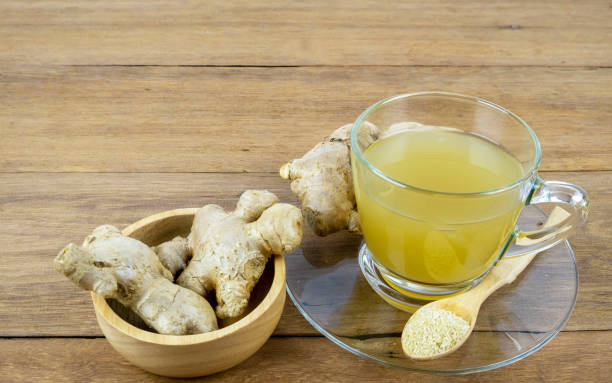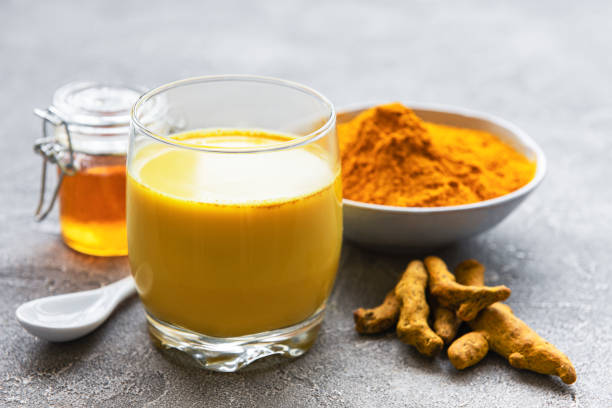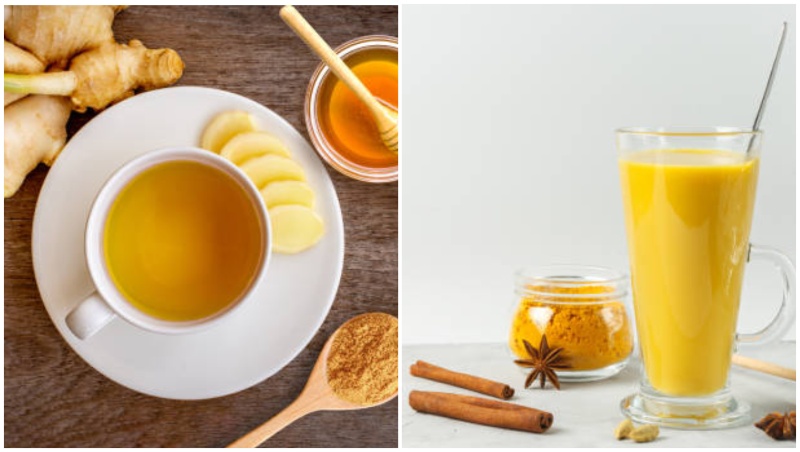Benefits Of Turmeric And Ginger, How To Use, & Side Effects
Herbs and spices are more than just food flavorings. They are powerhouses of antioxidants, anti-inflammatory compounds, and other beneficial substances. Two such well-known members are ginger and turmeric. Incorporated into meals and even turned into teas or milk, they are known to work wonders for your well-being.
What Is Turmeric And Ginger Tea Good For?
Turmeric and ginger are renowned for their anti-inflammatory and antioxidant modalities. Combining these two in a tea offers excellent immune-boosting benefits and helps fight off free radicals, inflammation, and diseases. Plus, this tea also contributes to your overall hydration goals!
10 Benefits Of Ginger and Turmeric
1. Ginger Can Help You Shed Those Extra Pounds
Ginger can speed up your metabolism, hence assisting in weight loss. It is also known to help curb your cravings, thereby helping you adhere to your diet plans.
2. Ginger Is Beneficial For Indigestion
Ginger promotes proper digestion and can help alleviate symptoms of gastrointestinal distress such as heartburn and bloating.
3. Ginger Helps Reduce Period Pains
Ginger can help alleviate menstrual pain due to its anti-inflammatory properties. Having ginger tea during your period could contribute to a more comfortable cycle.
4. Ginger Improves Brain Function
Several studies show that ginger can improve brain function by protecting against age-related decline in brain health.
5. Ginger Lowers Your Cholesterol Levels
Regular consumption of ginger can contribute to reducing LDL cholesterol levels, the ‘bad’ type of cholesterol that can increase your risk of heart disease.
6. Turmeric Decreases Your Risk Of Developing Cardiovascular Diseases
The active compound in turmeric, curcumin, is known to improve the function of the heart’s endothelium, potentially reducing your risk for heart disease.
7. Turmeric May Help Decrease Symptoms Of Depression
Some research indicates that curcumin can boost mood and reduce symptoms of depression, though more studies are needed to confirm these effects.
8. Turmeric Helps Lower Your Blood Sugar Levels
Curcumin can act to reduce blood sugar levels and improve insulin sensitivity, which can particularly benefit individuals with diabetes.
9. Turmeric Makes Your Skin Healthy
The antioxidant and anti-inflammatory properties of turmeric can aim at preserving skin health, fighting off breakouts, and reducing scarring.
10. Turmeric May Help In Preventing Eye Diseases
Some preliminary research suggests that curcumin could delay the onset of cataracts and even slow down the progression of glaucoma.
How To Use Ginger And Turmeric
Ginger Tea

Ingredients
- ginger
- boiling water
- honey
Instructions
- Slice and peel 1 small piece of ginger.
- Take a saucepan and boil 1 cup of water.
- Add the sliced ginger and 1 teaspoon of honey to the boiling water.
- Bring the mixture to a boil and then bring it down to a simmer.
- Let the mixture simmer for 5 minutes.
- Remove the ginger from the mixture.
- Pour the mixture into your favorite cup and sip it hot.
Turmeric Milk

Ingredients
- turmeric powder
- pepper powder
- milk
- honey
Instructions
- Take 1 cup of milk in a saucepan.
- Boil it till it becomes slightly hot.
- Add 1 teaspoon of turmeric powder.
- Add 1 teaspoon of pepper powder.
- Stir it well till the powders mix well.
- Add 1 teaspoon of honey and stir it.
- Pour it into your favorite cup and sip it.
Side Effects
Though mild, possible side effects could include stomach upset, nausea, dizziness, or diarrhea. Turmeric may also thin your blood, so be cautious if you’re on blood thinners or having surgery soon.
Frequently Asked Questions
1. Can I take turmeric and ginger together?
Yes, you can take turmeric and ginger together. They enhance each other’s properties, provide significant health benefits, and can contribute to overall wellness.
2. What is the best time to consume ginger and turmeric?
There is no specific best time to consume ginger and turmeric as it can depend on what you’re using it for. However, some people prefer to take it in the morning on an empty stomach for the best absorption and maximum benefit.
3. Can pregnant women intake ginger and turmeric?
While small amounts of food are considered safe, pregnant women should generally avoid consuming large amounts of ginger or turmeric supplements.
4. Can I consume turmeric and ginger if I have a medical condition?
Turmeric and ginger are usually safe to consume, but if you have a medical condition, it’s always best to consult your healthcare provider before adding them to your diet in large amounts.
5. Can ginger and turmeric cause allergic reactions?
Though rare, some people may be allergic to ginger or turmeric. If you experience such an allergic reaction, it is recommended to stop the consumption immediately and check with your healthcare professional.
6. Can Ginger And Turmeric Help Fight Pain And Sickness?
Yes, both ginger and turmeric have anti-inflammatory qualities that might help fight symptoms of flu and minor aches.
7. Is It Good To Consume Turmeric And Ginger Every Day?
In moderate quantities, yes! Incorporating ginger and turmeric into a balanced diet can contribute to overall health.
Key Takeaways
Turmeric and Ginger offer a myriad of health benefits, making them potent superfoods that you can easily incorporate into your daily regimen. Despite potential mild side effects, the long-term benefits make them an essential part of a balanced diet.
READ ALSO: 4 Health Benefits to Drinking Onion Water That You Should Know
